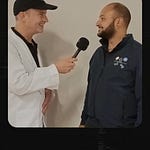Anthony Quigley – Educator – Entrepreneur – Investor
Career Profile
Anthony Quigley is a seasoned entrepreneur with over 30 years experience developing, managing and leading successful businesses. He is a senior board-level advisor to venture companies and start-ups.
Anthony has a passion for education, which is why the businesses he founded are normally educational institutes. He founded and led Digital Marketing Institute (which was acquired in 2017) after creating the Global Certification Standard in digital marketing, with courses taught in over 80 countries. Anthony founded Code Institute in 2015 in an effort to fix the chronic programming skills shortage that exists in the tech sector.
He has either founded or held director-level positions in eWare, Xanthal, iQuate, Microsoft, Net Results and Web Kitchen among others.
Conor at Self Makers had the pleasure of interviewing Anthony and hearing about his successful career, as well as gaining insightful tips and advice that could be helpful towards your career journey and are listed below.
The exit
When Anthony and his business partner were proposed with an offer to buy the Digital Marketing Institute, they couldn’t help but wonder how much they could make. “We decided ‘well if somebody is that interested in this company, then let’s see what we could get should we exit.’ ‘Do I want to sell this? Is there more value here? Do I love this company? Do I really want my staff to move on to new owners?’.
When I started ‘Code Institute’, I started with the end in mind. The end was ‘let’s sell it’. Even though we don’t have a business, we don’t have a start, I don’t have any money, I don’t have any products, I don’t have any people and I have no income, but we’re going to sell this. If you start with that in mind then you know where you are going but if you don’t start with that in mind then you’re just in the business of running and growing business for no reason.”
Business pioneer
“I’m good at starting and growing a business to between €10 – €50 million capitalisation.
I am like a builder who can dig the ground, get the foundations in, get the first block up and get the apartment block to a point where somebody else can take over and do all the shuffling bits and the filling in. Then they can manage that apartment block for the next 10 to 50 years.” Continuing on from this metaphor about constructing apartments, Anthony stated “collecting rent doesn’t excite me, putting the foundations in excites me”.
Opportunities are everywhere
“You could go into any area and find opportunities. There is no lack of opportunities.”
“All education is going through a disruptive time at the moment, and it is being accelerated because of the pandemic. I would suggest looking five to 10 years out and that’s where you should be thinking. ‘Will the universities figure out how to go online?’ ‘Will they share their knowledge and information?’. All I am doing is picking away at tiny pieces of the education world globally.
Top advice for becoming your own boss
“The internet is full of stuff. It’s choka block with stuff. It is actually hard to find what you want. If I was to ask you for recommendations you would give me half a dozen. The only recommendation I ask people for is Netflix and that’s just for entertainment.
I don’t have to read a lot of stuff around what I do but I would possibly read books around culture and governance itself. In terms of podcasts, I tune into David McWilliams from time to time. He makes a great effort and he does really well at explaining economics in layman’s terms.
If I was to give advice to any start up, it would be to understand what your audience is and stop trying to be everything to everybody. We pay a lot of money to Google because if somebody types in ‘I’d like to do corporate governance certification’, I want to be found for that. However if somebody types in ‘I’d like to do certification’, I don’t want to be found for that. Or ‘I want to find out about how to become a non-executive director’, I want to be found for that. It is understanding exactly what your customer is but more importantly, who your customer is not. If you can understand who your market is not, then you’re not targeting them.”
How do you identify the right people to bring in?
“Hiring is not one of my strengths – I don’t always get that right. In fact I quite often get it wrong. What we did in Digital Marketing Institute and in Code Institute was hire a really good CEO. It takes a few goes, and sometimes you don’t get it right. We got it right in Code Institute. Hire a few good people in the beginning, but try and find somebody that is going to help grow the company. Someone who is better at hiring and better at managing individuals than I am. I’m good at certain things, hiring individuals and managing individuals is not one of my core strengths. I like to find people who are really good at what I am not good at.”
Tips for becoming a better sales person
“Finance – you just have to learn it and you’re going to make mistakes along the way. Individuals sometimes find sales difficult. People love a good sales person. Don’t ever not ask for business. Here’s the hardest part of sales… to sell the first 10 items. Or sell the same item 10 times for that matter.
Give yourself an environment where you feel comfortable that you are selling something of value. You have to believe in that. If you are on your own and have built something, I would strongly suggest you try and get somebody to give you money for it. If they give you money for it they believe in you and if they give you money a second time, you’re on a winner. Now not only have you proven yourself once, you have proven that actually they will come back for more which is really good.”













Share this post